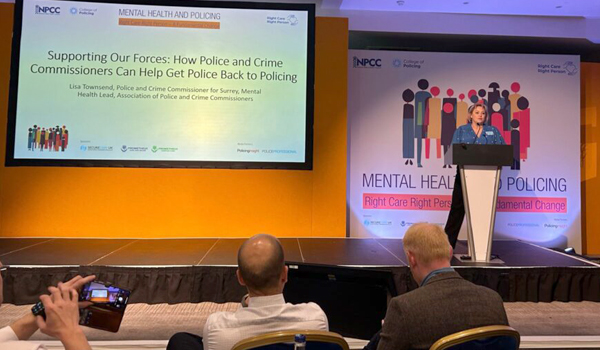PCC’s warning as crisis in care ‘takes officers off the front line’
Surrey’s police and crime commissioner says it is time for “real and fundamental change” to take the burden off officers responding to mental health incidents.
Lisa Townsend said in February alone, Surrey Police officers spent 515 hours on incidents relating to mental health – the highest number of hours ever recorded in a single month by the force.
She said over the past seven years, the number of hours police in Surrey are spending with people in crisis has almost trebled.
Ms Townsend, the Association of Police and Crime Commissioners lead for mental health and custody, said the “crisis in mental health care” is taking Surrey Police officers off the front line. During March, two officers spent a full week supporting a vulnerable person, taking them away from their other duties.
More than 60 people were detained when they were in crisis in February. The detentions were mostly in police vehicles as a result of ambulance shortages.
In 2022/23, officers dedicated 3,875 hours to supporting those in need under section 136 of the Mental Health Act, which gives police the power to remove a person believed to be suffering from a mental disorder and in need of immediate care to a place of safety. All section 136 incidents are double-crewed, meaning more than one officer must attend.
Ms Townsend said the issue draws officers away from fighting crime and may even be “dangerous” for a vulnerable person’s wellbeing.
As national Mental Health Awareness Week began on Monday (May 15), Ms Townsend said the burden of care is falling on officer’s shoulders amid nationwide challenges to provide support to the most vulnerable.
However, she says a new national model will take the responsibility away from police will bring “real and fundamental change”.
‘Right Care, Right Person’, which has its origins in the NHS, is an approach designed to ensure that when there are concerns for a person’s welfare linked to their mental health, medical or social care issues a simple principle guides the response.
That is the right person with the right skills, training and experience should provide the appropriate level of care and support.
The NHS says ensuring care is provided by the agency that can best meet the individual’s needs should be the overriding objective for health and policing to establish, and it is clear that in many cases this will not be the police.
Across England and Wales, there was a 20 per cent increase in the number of mental health incidents police had to attend last year, according to data from 29 of 43 forces.
“These figures show the huge damage caused across society when appropriate interventions aren’t made by the NHS,” Ms Townsend said.
“It is neither safe nor appropriate for police to pick up the pieces of a failing mental health care system, and may even be dangerous for the wellbeing of a person in crisis, although officers should be applauded for the fantastic job they do under a great deal of pressure.
“Unlike doctor’s surgeries, community health outreach programmes or council services, the police are available 24 hours a day.”
She added: “We have seen time and time again that 999 calls to help someone in distress spike as other agencies close their doors.
“The time has come for real and fundamental change.
“In the coming months, we hope that forces around the country will no longer have to attend every mental health incident reported. We’ll instead follow a new initiative called Right Care, Right Person, which began in Humberside and has saved officers there more than 1,100 hours per month.
“It means that when there are concerns for a person’s welfare that’s linked to their mental health, medical or social care issues, they’ll be seen by the right person with the best skills, training and experience.
“This will help officers return to the job they have chosen – that of keeping Surrey safe.”
Phase one of Right Care, Right Person started in March and relates to ‘concern for welfare’.
This is concern for a person or group of people expressed by another person or partner agency/ corporate business.
Those concerns are made directly or indirectly to the police in the expectation that officers will assume responsibility and legal liability for those people and seek to mitigate or minimise any apparent risk posed.
This will usually result from a request made via the force control room for a welfare check or visit to be made.
Under the initiative, police will only attend a concern for welfare call for service if it is deemed to be a genuine emergency, for example that a person is at a real and immediate threat of death or serious harm; it is assessed the person(s) has been subjected to at least serious harm; and the individual(s) is a person within the care of the police and is facing some harm.
Unless this threshold is reached the police have no duty to take action.


